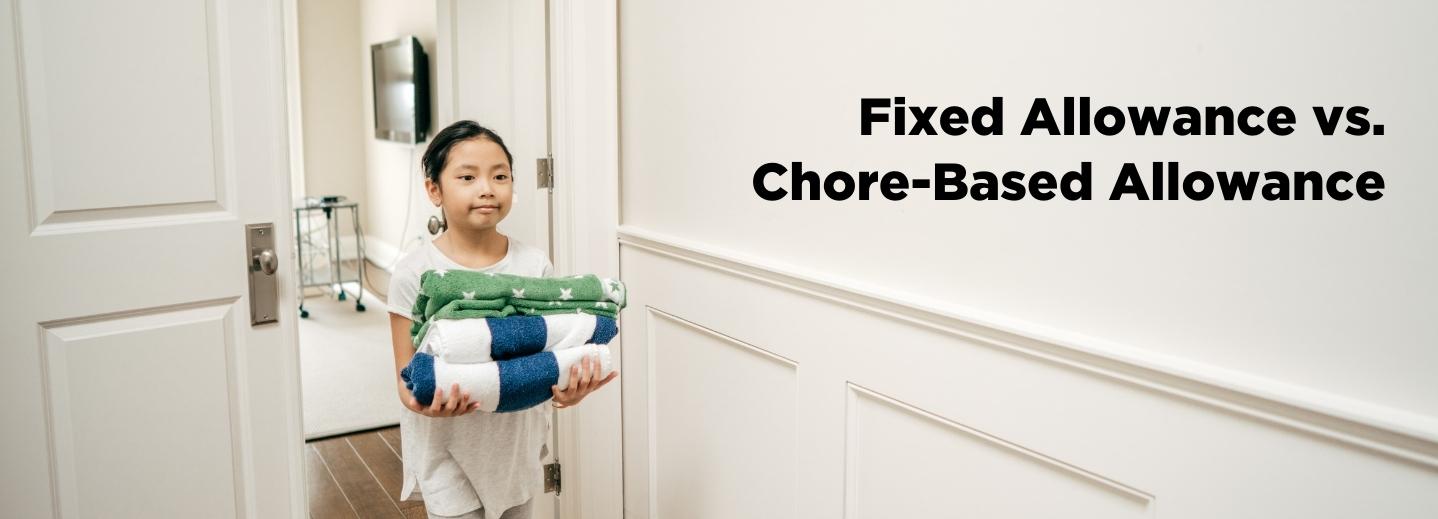Fixed Allowance vs. Chore-Based Allowance: Which Should You Choose?

Every parent knows that feeling when their child is begging for candy at the grocery store or your teen asks for cash before going out with friends. Do you give in, or make them use their allowance money? Paying children an allowance is common practice today, but remember you can take advantage of this opportunity to teach responsible money management and important decision-making skills.
Types of Allowances
There are two main types of allowances – Fixed Allowance and Chore-Based Allowance. While there are advantages and disadvantages to each, what you decide in the end should be whichever you’re more comfortable with, and feel will benefit your child the most. We listed the pros and cons of both types of allowances so that you can make more informed decisions for yourself and your children.
Fixed Allowance
A fixed allowance is a set amount of money given out weekly (or monthly). For example, you may give your child $10 every week, regardless of whether they perform chores. If you choose a fixed allowance, it’s important to stress that they will not receive any extra money throughout the month. If a more significant expense comes up in the future, they’ll have to save up for it rather than ask you for more money.
Pros:
- Easier to budget a fixed income
- Easier to recover from financial mistakes
- Teaches responsible money management; for example, when you require them to pay for something necessary, like school lunches
Cons:
- Does not instill a work ethic since they are not earning the allowance
- May perpetuate a feeling of entitlement towards money
Chore-Based Allowance
With chore-based allowance, you can teach your child the value of money and get some help around the house with basic chores, that may include tasks such as cleaning the kitchen, taking out the trash, or walking the dog. As your child matures, the chores could become more substantial and include jobs such as mowing the lawn, cleaning the garage, or washing the cars.
When using the chore-based approach, it’s important to stress that earning an allowance requires responsibility. Children should not feel as though they can just ignore the chores for a week. Instead, it should be their responsibility regardless, and the allowance is a reward for their hard work.
Pros:
- Teaches them that money is earned
- Teaches work ethic by requiring them to allocate time and energy to complete their tasks
- Motivates them to work harder in order to earn more money
- Sharing daily chores helps the whole family
Cons:
- It may be challenging to complete chores if they have a busy week or a lot of extracurricular activities.
- Harder for them to budget since the weekly allowance can be variable.
Helping Your Child Manage Their Allowance
The methods you use to teach your child about saving and money management will inevitably vary by age. For example, younger children are great visual learners, which is why piggy banks are so popular for kids. Teens tend to need more flexibility when it comes to spending.
- Kids: Open a Kids Savings Account at CAMPUS. Then, when your child receives their allowance, save a portion in their piggy bank, and deposit the rest in their savings account. This strategy helps them understand their piggy bank money is for spending and the rest is for saving.
Teens: Opening a Rising Star (Teen) Checking Account with a debit card is a great way to introduce your child to responsible money management. They will learn how to review their balance online and how debit card transactions work. You can also link your account to theirs – allowing you to monitor their spending and easily deposit their allowance right into their account.
CAMPUS Can Help!
There are many pros and cons of both fixed and chore-based allowances. Whichever option you decide to implement is entirely up to you. After all, you know what works best for your child. The important thing is that you’re teaching your child the value of money and instilling financial responsibility.
If you would like to open a Rising Star Checking Account for your teen, or a Kids Savings Account for your child, we’re ready to help. Please stop by any of our convenient service center locations or call 800-367-6440 to get started today.
Other Resources:
How to Introduce Your Teenager to Banking
Kids & Money: Start Saving Habits Early
By CAMPUS USA at 16 Mar 2022, 14:31 PM